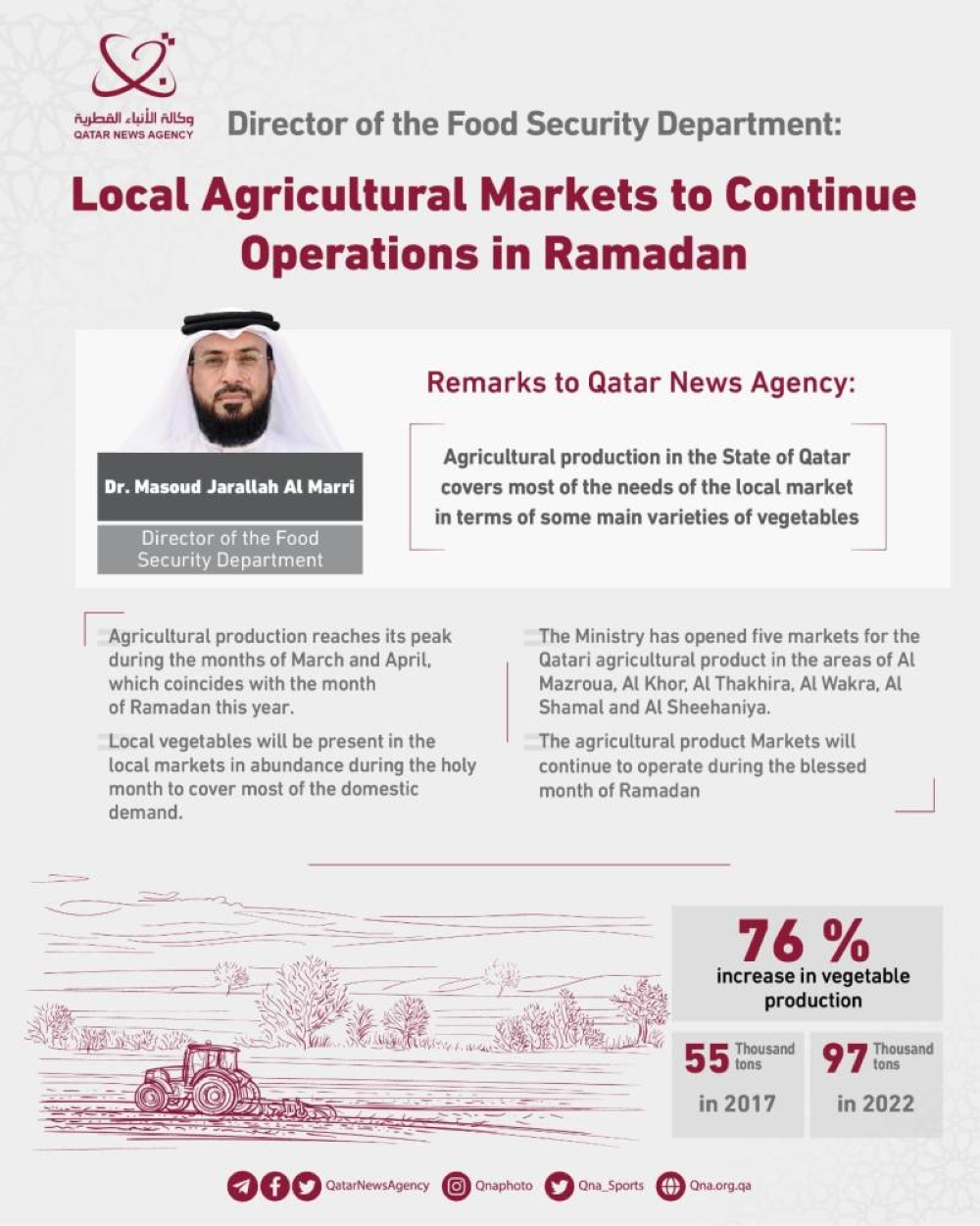With the beginning of the holy month of Ramadan, the local markets are witnessing a great demand from citizens and residents to buy goods, food products, and the requirements of the holy month, amidst a diversity that has become evident in the local market, which allows consumers to choose between goods in terms of prices and quality, and to choose what suits them.
Among these food products that citizens and residents demand are agricultural products, whose consumption rate increases during holiday seasons.
This increase was matched by an increase in the national production of vegetables during the past few years, according to figures issued by the concerned authorities.
Director of the Food Security Department Dr Masoud Jarallah al-Marri told QNA that agricultural production in Qatar covers most of the needs of the local market in terms of some main varieties of vegetables, such as cucumbers and tomatoes.
Agricultural production reaches its peak during the months of March and April, which coincides with the month of Ramadan this year.
Therefore, local vegetables will be present in the local markets in abundance during the holy month to cover most of the domestic demand.
The Director of the Food Security Department added that the holy month of Ramadan usually witnesses an increase in the volume of vegetable consumption compared to the rest of the year, and the local demand for some varieties of Qatari vegetables increases during the month of Ramadan, as they are fresh and of high quality.
The agricultural sector at the Ministry of Municipality works to coordinate with producing farms in the country to increase the areas planted with vegetables, to contribute to covering consumers' needs of vegetables during this period of the year.
Dr al-Marri said that the Qatari agricultural sector has made a huge leap towards achieving food security. Vegetable production increased from 55,000 tonnes in 2017 to reach about 97,000 tonnes in 2022, an increase of 76%.
He explained that in order to support the productive Qatari farms in marketing their products directly and to ensure that consumers obtain their needs of fresh local vegetables, the agricultural product yards will continue to operate during the blessed month of Ramadan, noting that the Qatari agricultural product yards are considered one of the most important marketing programmes that the agricultural sector at the Ministry of Municipality launched in recent years.
The ministry has opened five yards for the Qatari agricultural product in the areas of Al Mazroua, Al Khor, Al Thakhira, Al Wakra, Al Shamal and Al Sheehaniya.
The idea of the yards is to provide an opportunity for the Qatari agricultural product to market its own production without an intermediary, which contributes to reducing marketing costs to the lowest possible extent, as well as reducing vegetable waste.
Reports show that Qatar's production of some vegetables exceeds domestic consumption rates, in addition to that the local market needs about 2,000 tonnes of cucumbers and about 6,000 tonnes of tomatoes per month, and these needs are secured through Qatari farms during the agricultural seasons.
The demand during Ramadan is witnessing an increase by outlets and shops for local vegetables, as they have become completely dependent on them, especially during the winter season, when it reaches a 100%, as these products now fully cover consumer demand.
It is noteworthy that the Qatar National Food Security Strategy 2018-2023, which is entering its final year, focused on four main pillars: international trade and logistics, domestic self-sufficiency, strategic reserves, and enabling factors: local markets.
The Ministry of Municipality is currently working on preparing the strategic plan for food security for the agricultural sector until 2030, which will include goals, areas of development, initiatives and outputs, and will be shared with the private sector.
In addition, the ministry is working to launch an initiative to develop agricultural services and implement digital transformation projects in the sector, agricultural digitisation, and a digital farmer community, which would raise efficiency and support decision-making for this currently vital sector of the country. (QNA)

